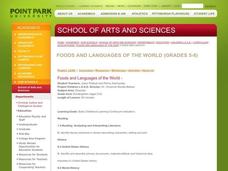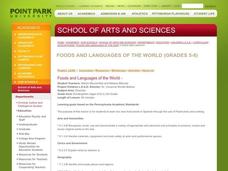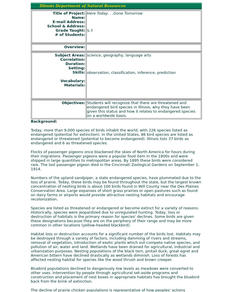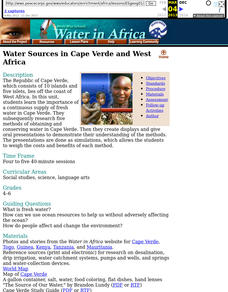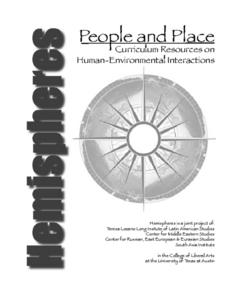Channel Islands Film
Human Impact on the Food Web of Santa Cruz Island
What happens when a non-native species is introduced onto an island? Santa Cruz Island, part of the Channel Island chain located off the coast of southern California, provides the perfect laboratory for young environmental scientists to...
Curated OER
Foods and Languages of the World
Students study world cultures with an emphasis on languages and cultures. In this world cultures lesson, students study the countries of Spain, China, Italy, and the United States. Students read the story Everybody Cooks Rice and move...
Environmental Education in Wisconsin
Biome Travel Guide
In a perfect marriage of social studies and science, groups work together to research and create a travel guide presentation to share with the class. Not only do kids learn about the climate and geography of a biome, but also the...
National Museum of the American Indian
The A:Shiwi (Zuni) People: A Study in Environment, Adaptation, and Agricultural Practices
Discover the connection of native peoples to their natural world, including cultural and agricultural practices, by studying the Zuni people of the American Southwest. This lesson includes examining a poster's photographs, reading...
Berkshire Museum
The Three Life-Giving Sisters: Plant Cultivation and Mohican Innovation
Children gain first-hand experience with Native American agriculture while investigating the life cycle of plants with this engaging experiment. Focusing on what the natives called the Three Sisters - corn, beans, and squash - young...
Alabama Learning Exchange
Make a Difference!
We are very dependent upon other life forms around us to survive. Here, scholars explore relationships in the ecosystem with the help of Auntie Litter and the pollution patrol. They imagine a world without grass, making connections to...
Curated OER
Recycling and Composting
Students set up composting sites that allow food scraps and paper to be recycled by nature. They are introduced to one aspect of recycling; composting. Students see how God recycles as the worms change garbage into something that brings...
Practical Action
Floating Garden Challenge
Climate change is affecting communities living in riverside areas by flooding land where crops used to grow. Using an array of instructional materials provided in this resource, you will have the opportunity to task your critical...
Curated OER
Foods and Languages of the World
Students review Mexico's location and language and learn to pronouns 10 new Spanish food words. Students listen as the book, Corn is Maize is read, touching and passing around an ear of Indian corn. Students discuss the contribution of...
Curated OER
Farming: It's a Fact
Understanding where our food and textiles come from is key to understanding business, economics, and the importance of modern agriculture. Learners play a game, read text to determine farm fact from opinion, and itemize a grocery receipt...
Curated OER
Fruits and Vegetables in the Food System
Students examine the importance of local markets. In this horticulture lesson, students examine the importance of local markets and food systems that can provide profit for growers, freshness, variety and quality.
Curated OER
Hidden Science in Colonial Living
Fifth graders evaluate evidence that indicates a physical change has occurred. For this colonial living lesson, 5th graders explore the science involved in the making of items used in colonial life, such as, bread, butter, soap,...
Curated OER
Quality of Life Investigations: Risk Reductions
Students participate in a discussion of recent environmental issues affecting their own community or ones nearby. In groups, they research the role of food additives and the purpose of adding them to foods. They also determine their...
Channel Islands Film
Natural Resources, and Human Uses of Plants and Animals
As part of their study of the restoration projects on Santa Cruz Island, class members demonstrate their understanding of the connections among plant life, animals, and the actions of humans by crafting a model that reveals these...
Curated OER
Here Today. . .Gone Tomorrow
Learners observe that there are threatened and endangered bird species in Illinois, why they have been given this status and how it relates to endangered species on a worldwide basis. they participate in the Project WILD "Oh, Deer" or...
Curated OER
The Pumpkin Patch - A Venture in Agritourism
After reading an article about how agritourism is helping boost the financial stability of local farms, middle schoolers answer comprehension questions. This is a case-study of Canadian pumpkin producers. It could be useful as a...
Curated OER
Double Trouble?
Students investigate cloned meat and animal products. In this food safety lesson, students research the noted Web sites in search of information about cloning and food labelling. Students use their findings to create informative...
Curated OER
Cloudy With A Chance of Meatballs
Second graders explore weather. In this weather lesson, 2nd graders read Cloudy With A Chance of Meatballs and participate in four supplemental science activities. Students participate in Internet research, create weather maps,...
Curated OER
Building a Mini-Park and Bird Sanctuary
Students build a list of gardening vocabulary from prior knowledge of gardens. In this gardening lesson, students understand the importance of gardens to humans and animals for food, shelter, and air. Students discuss the garden in...
Curated OER
Why Do Some Birds Have Two Homes When We Have One?
Sixth graders study migratory birds in the temperate forest and the tropical rainforest. In this migratory birds lesson, 6th graders participate in different activities that explain patterns of migration, research patterns of movement...
Curated OER
What We Eat, Where We Sleep: Documenting Daily Life to Tell Stories
This is not just a New York Time article to read, this is a set of amazing activity ideas all related to the slide shows "Breaking Bread Everywhere" and "Where Children Sleep." Your class can view each show, read about what they mean...
Captain Planet Foundation
P is for Poppies
Explore the way local farming and rationing helped the war effort in World War I with a lesson plan on gardening. After learning about trench warfare, reading "In Flanders' Field" by John McCrae, and studying poppies, kids discuss the...
Curated OER
Water Sources in Cape Verde and West Africa
Young explorers study the scarcity and importance of a continuous supply of fresh water in Cape Verde. They research the five main ways that fresh water is obtained in these countries. Each research group prepares a presentation, and...
Curated OER
Big Dam Construction in India
This complete and full resource includes everything needed to conduct a lesson on the environmental impact of large dams in India. Background information, handouts, answer keys, and web links are all there to help you educate your class...
Other popular searches
- Science Project Food Apples
- Science Project Food Chain
- Science Project Food Waste
- Science Project Food Rice
- Food Science Fair Projects
- Science Project Food Decay
- Science Projects Food Chain



